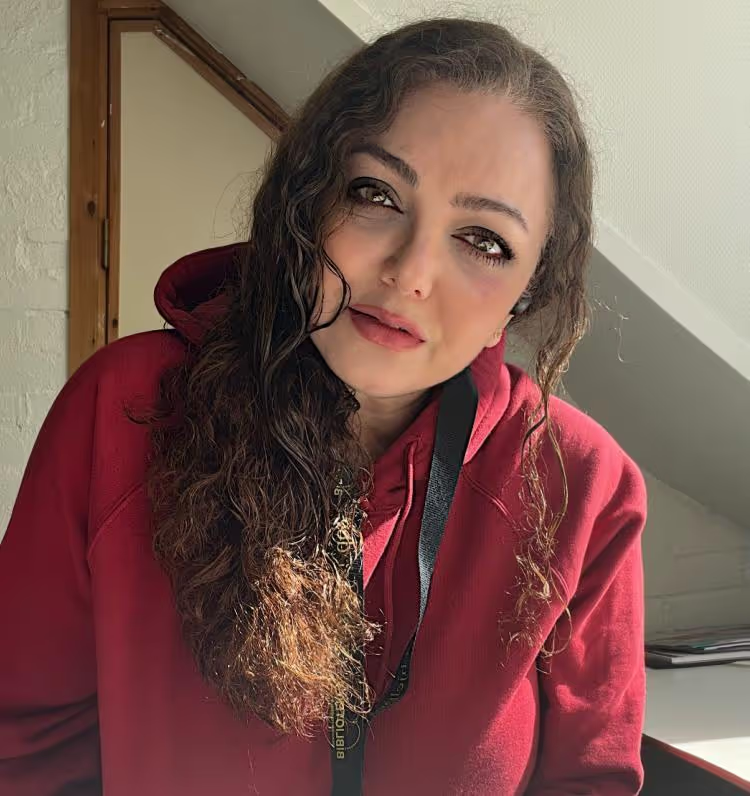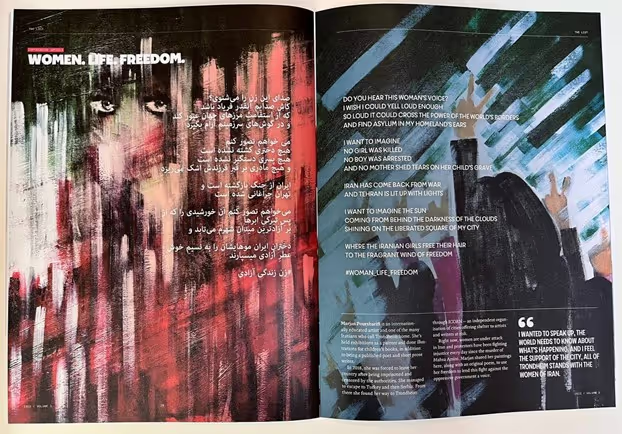Reflecting on an ICORN residency and the road to it: An interview with Marjan Poursharifi

Marjan Poursharifi is a poet, writer, and illustrator from Iran, who has been the ICORN resident in Trondheim since 2020. Over the past two years, Marjan has been involved in several initiatives, including a weekend of community activities at Trondheim’s Kunsthall, a meeting with local residents and politicians, and her first art exhibition in Norway.
Despite arriving amid the COVID-19 pandemic, Poursharifi was also able to finish her latest poetry collection and successfully settled in Trondheim. Marjan’s literary work revolved around issues of women’s rights, freedom of speech, and love.
In an interview with the ICORN Secretariat, Marjan reflects on her experiences of her ICORN residency and the period prior to her arrival in Norway, as well as the inspirations and challenges on the way.
ICORN: What inspired the poetry collection you have been working on during your ICORN residency in Trondheim?
Marjan: I write to show one’s feelings and, in that collection, the main idea was the strength hidden in a woman’s broken heart. I was inspired by the freedom of birds and how similar a woman can feel if she is free, able to touch the sky if she wishes. But I also wrote about the difficult moments in a woman’s life, about the immigration process, with an empty hand but a heart full of love and hope for the future. I was inspired not only by womanhood without any borders or fears, but also by motherhood. I just tried my best to write about women’s experiences.
ICORN: How do the creative processes behind writing poetry and illustrating differ, if at all?
Marjan: Writing and illustrating are a mirror of my innermost heart and its aches. I write what I cannot say, and I write exactly what I feel. The same applies when I paint or illustrate through the means of colours, lines, or shapes. I express my feelings in my poems, and I reflect them in my illustrations- the only question of difference is which one is closer to the source. Illustrations are probably more genuine as it requires all of me to paint them. Then, what I leave on paper is the moments of my life, and all its tears and smiles.
ICORN: Expressing yourself freely in Iran led to your whole family being under threat- did you anticipate there would be so much risk involved?
Marjan: I actually never thought that writing about love and women having a free life in Iran would involve so many risks for me and my family. I lived in a strange society where showing support for women is a taboo. My work was a way to express myself and my experiences as a woman in Iranian society. At the beginning, I was publishing my writing on social media as I wanted to reach out to other people, make them my readers, and share my feelings with them- I just wanted a life without borders. I never knew that this could be dangerous.
ICORN: When did you realise that you and your family had to leave Iran?
Marjan: When we were living in Iran, we were forced to show up in one of Sepāh’s offices every three months and sign a document confirming that we were not acting against the law. Due to our record of political opposition, we were unable to get jobs and any time there was a social or political movement in Iran, we were worried that we would get arrested in our home. In these conditions, we always knew that we had to leave. It was just a matter of waiting for the right moment.
ICORN: Before arriving in Norway as ICORN resident, you were in exile in Serbia. What were your experiences there?
Marjan: We were unable to get to Turkey and the other option was to flee to Greece through the sea and risk our lives. Serbia was the only choice for us. There we lived in a camp on the border, which was relatively safe, but there was no warm water for showering, no healthcare, and no education for my young son. Since arriving in Norway, we got a second chance to rebuild our life, with the support of Trondheim, ICORN, and PEN Norway.
ICORN: Iran has been experiencing its biggest and longest lasting protests for 45 years while you have been in Norway. How have you dealt with the situation from exile?
Marjan: What is currently happening in Iran is a nightmare for humanity. I, and millions of other Iranians forced to live in exile, are witnessing our fellow citizens being tortured, raped, and killed every day. The victims are mostly the younger sections of the population, with many children among them. It is very painful to be unable to do anything from here- we can only be their voice on social media and organise protests from abroad to condemn the actions of the Iranian government. For my part, I contributed to Trondheim’s artistic List Magazine in its Winter 2022 edition. I had two pages where I displayed two of my paintings and one of my poems in Farsi and in English in support of Iran’s ‘Woman, Life, Freedom’ movement and the revolution and raising local awareness if the situation in my home country.

ICORN: Now that your ICORN residency has come to an end, what are your plans in professional and personal terms?
Marjan: My ICORN residency ended in December 2022. I am now on a new path which can be a big change after two years of residency, especially when it comes to challenges such as finding a permanent job and staying on my own feet. Right now, I am a substitute art teacher at a local cultural school and I continue to write and paint every moment of my life. I am planning to have more exhibitions and publish my new book in Norwegian and Farsi in the very near future.



